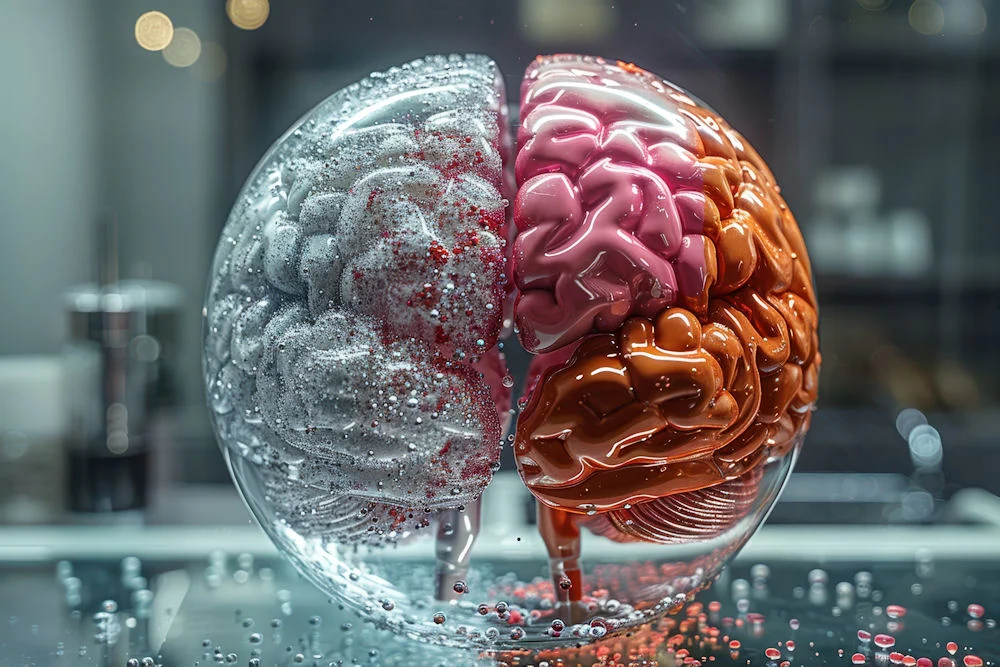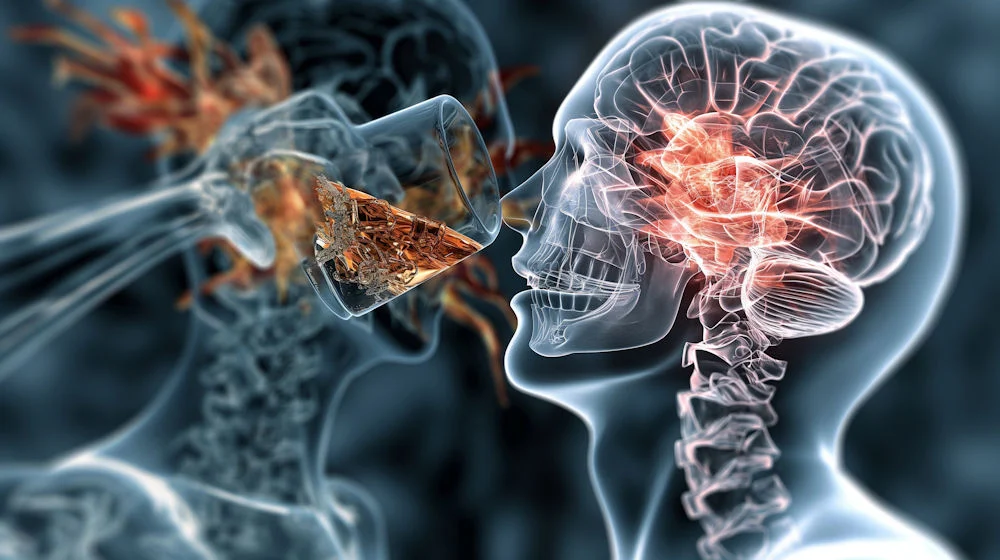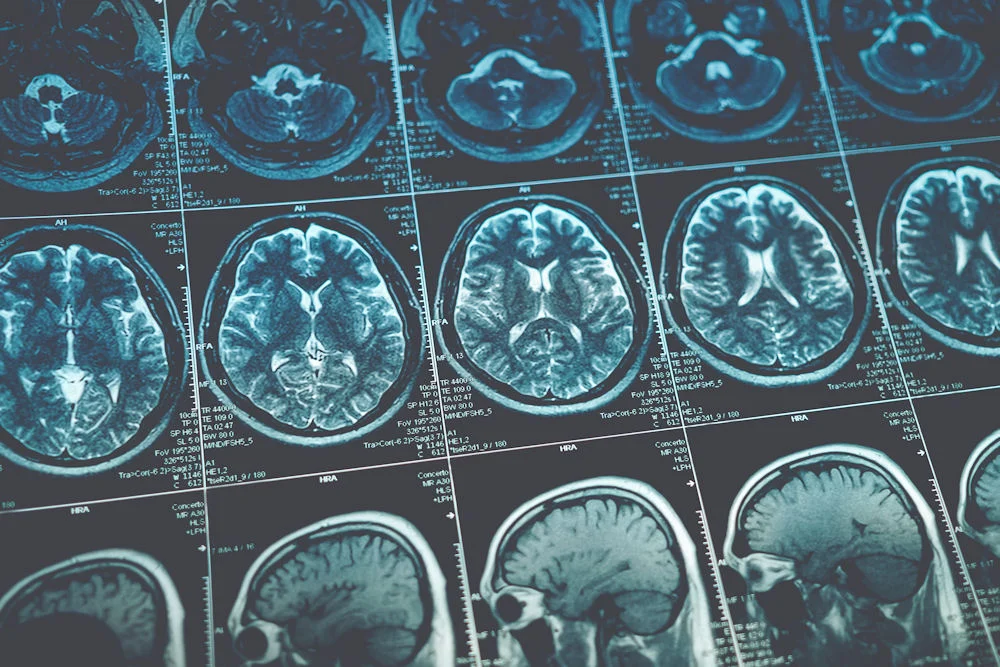Whether you’re here out of concern for yourself, a loved one, or simply to learn more, understanding alcohol brain damage is an important step toward awareness and health. This serious condition affects millions of Americans each year and can have lasting impacts on cognitive function and quality of life.
At Bayview Recovery Center in San Diego, California, we’re committed to providing education and support for those affected by alcohol-related brain conditions, offering specialized treatment for men in recovery, including those in the LGBTQ community.
In this article, we explore how alcohol affects the brain, what symptoms might indicate damage, and what recovery options exist. By understanding these aspects, you can make more informed decisions about alcohol use and brain health.
Unlike temporary effects like intoxication, alcohol brain damage represents lasting changes to the brain. According to the National Institute on Alcohol Abuse and Alcoholism (NIAAA), approximately 50% of people with alcohol use disorder experience some form of cognitive impairment. Of these, about 10% develop severe neurological conditions like Wernicke-Korsakoff syndrome, sometimes called “wet brain.”
The severity of alcohol brain damage exists on a spectrum:
- Mild effects: Subtle memory problems and difficulty concentrating
- Moderate effects: Noticeable cognitive impairment and mood changes
- Severe effects: Significant memory loss, confusion, and physical coordination problems
What makes alcohol brain damage particularly concerning is that some changes may be permanent, while others can improve with sobriety and proper treatment.
How Does Alcohol Affect the Brain Long Term?
Alcohol (ethanol) is a toxin that crosses the blood-brain barrier—a protective filter that normally keeps harmful substances out of the brain. Once inside, it disrupts how brain cells function and communicate.
When alcohol enters the brain, it alters neurotransmitters—the chemical messengers that carry signals between brain cells. It increases the effects of GABA (which slows brain activity) while decreasing glutamate (which excites the brain). This imbalance, when repeated over the years, can permanently alter brain chemistry.
Research from the NIAAA shows that chronic alcohol exposure can cause brain cells to shrink and even die, particularly in regions responsible for learning, memory, and decision-making. Brain scans of long-term drinkers often show reduced volume in the frontal lobes and cerebellum.
Many people with alcohol use disorder develop nutritional deficiencies that harm the brain. The most critical is thiamine (vitamin B1), which helps brain cells convert sugar into energy.
Alcohol interferes with thiamine in three ways:
* Reduces absorption from food in the digestive tract
* Decreases storage in the liver
* Impairs the enzymes that activate thiamine in the body
A severe thiamine deficiency can lead to Wernicke-Korsakoff syndrome, characterized by confusion, memory problems, and coordination difficulties. According to a 2022 study in the Journal of Clinical Medicine, up to 80% of people with alcohol use disorder have some degree of thiamine deficiency.
Other important nutrients affected by alcohol include folate, vitamin B12, and magnesium—all essential for brain health and function.
Alcohol damages blood vessels throughout the body, including those in the brain. This vascular injury can have serious consequences for brain health.
Long-term alcohol use is associated with:
- Weakening of small blood vessels in the brain
- Increased risk of stroke (both ischemic and hemorrhagic)
- Reduced blood flow to the brain tissue
- Higher blood pressure, which strains the brain vessels
When blood flow is compromised, brain cells don’t receive enough oxygen and nutrients. This can lead to cell death and permanent damage in affected areas. The Centers for Disease Control and Prevention (CDC) reports that heavy drinkers have a 1.5-2.5 times higher risk of stroke compared to non-drinkers.
People who drink heavily are more likely to experience traumatic brain injuries, creating a “double hit” to brain health.
Statistics from the CDC show that alcohol is involved in:
- Approximately 50% of traumatic brain injuries
- 40-60% of falls result in head injuries
- 30-40% of fatal motor vehicle accidents
Even mild head injuries can have lasting effects, and repeated injuries can build on each other. This cumulative damage, combined with alcohol’s direct effects on the brain, significantly increases the risk of long-term cognitive problems

Brain Damage From Alcohol: Signs and Symptoms
Cognitive and Memory Problems
- Short-term memory issues: Forgetting recent conversations, misplacing items, or repeating questions
- Planning difficulties: Struggling with tasks that require organization or multi-step processes
- Attention problems: Being easily distracted or unable to focus on conversations or tasks
- Confusion: Becoming disoriented, especially in unfamiliar environments
The differences between normal aging and alcohol-related memory problems can be subtle but important:
| Memory Change Type | Normal Aging | Alcohol-Related Brain Damage |
| Forgetting names | Occasionally happens | Frequent forgetting, even with close family |
| Misplacing items | Sometimes occurs | Happens regularly, may forget looking for the item |
| Learning new information | Slower but possible | Significantly impaired |
| Attention span | Slightly reduced | Markedly decreased |
| Following conversations | Generally maintained | Often lost or confused |
Motor Coordination Loss
- Balance problems: Unsteady walking, stumbling, or swaying
- Tremors: Shaking hands, even when not drinking
- Eye movement abnormalities: Rapid, involuntary eye movements (nystagmus)
- Fine motor difficulties: Trouble with precise movements like buttoning shirts or writing
These coordination problems may persist even during periods of sobriety, which distinguishes them from temporary intoxication effects. According to research published in Alcoholism: Clinical & Experimental Research, up to 60% of individuals with chronic alcohol use disorder show some form of motor impairment.
Mood and Behavioral Changes
- Personality changes: Acting in ways that seem out of character
- Emotional volatility: Experiencing mood swings, irritability, or inappropriate emotional responses
- Apathy: Losing interest in previously enjoyed activities or relationships
- Social withdrawal: Pulling away from friends and family
- Impulsivity: Acting without considering consequences
- Emotional regulation difficulties: Struggling to control anger, sadness, or anxiety
Family members and friends often notice these changes before the individual does. These symptoms can strain relationships and lead to social isolation, which may further worsen brain health.
Is Brain Damage From Alcoholism Permanent?

One of the most common questions about alcohol brain damage is whether it can be reversed. The answer depends on several factors, including the type and severity of damage, how early treatment begins, and individual health factors.
The brain has a remarkable ability to heal, especially when alcohol use stops early in the damage process. This healing capacity, called neuroplasticity, allows the brain to form new connections and adapt after injury.
With abstinence from alcohol, many people experience improvement in brain function:
- Within 2 weeks: Better sleep, reduced anxiety, and improved concentration
- 1-3 months: Noticeable memory improvements and clearer thinking
- 6-12 months: Continued cognitive gains and emotional stability
A 2022 study in JAMA Psychiatry found that after one year of abstinence, 86% of participants showed significant improvement in cognitive function. Areas most likely to recover include attention, processing speed, and verbal fluency. Factors that influence recovery potential include:
- Age: Younger brains generally have greater neuroplasticity
- Duration of heavy drinking: A Shorter history of alcohol use typically means better outcomes
- Overall health: Good nutrition, exercise, and management of other health conditions support brain healing
- Treatment approach: Comprehensive care that addresses both alcohol use and brain health improves results
Some forms of alcohol-related brain damage may be permanent, particularly in advanced cases. Wernicke-Korsakoff syndrome, when fully developed, often results in lasting memory deficits and cognitive impairment. In severe cases, individuals may need:
- Long-term care assistance with daily activities
- Cognitive rehabilitation to develop compensatory strategies
- Structured environments to support safety and functioning
- Ongoing medical management of symptoms
Even with permanent damage, quality of life can improve with proper support. Treatment focuses on preventing further damage, managing symptoms, and building on remaining strengths. Many people with irreversible alcohol brain damage still experience meaningful improvements in daily functioning and well-being with appropriate care.
How Much Drinking Leads to Alcohol Brain Damage
A standard drink in the United States contains about 14 grams of pure alcohol. This equals:
- 12 ounces of regular beer (5% alcohol)
- 5 ounces of wine (12% alcohol)
- 5 ounces of distilled spirits (40% alcohol)
The NIAAA defines low-risk drinking as no more than 4 drinks on any day and no more than 14 drinks per week for men. Drinking above these levels increases health risks, including brain damage.
Risk factors that make someone more vulnerable to alcohol brain damage include:
- Genetics: A Family history of alcohol problems may indicate genetic vulnerability
- Nutrition status: Poor diet increases the risk of thiamine deficiency
- Age: Older adults’ brains are more sensitive to alcohol’s effects
- Health conditions: Liver disease, heart problems, or diabetes can worsen alcohol’s impact
- Pattern of use: Binge drinking (consuming 5+ drinks in about 2 hours) is particularly harmful
According to a 2022 review in The Lancet, there is no “safe” level of alcohol consumption for brain health. However, risk increases substantially with heavy, prolonged use. Brain imaging studies show that even moderate drinkers (7-14 drinks per week) may experience some reduction in brain volume compared to non-drinkers.
Treatment for Alcohol Brain Damage
Treating alcohol brain damage requires a comprehensive approach that addresses both the alcohol use disorder and the specific brain changes that have occurred.
The first step in treatment often involves medical detoxification—a supervised process where alcohol is safely removed from the body. This phase typically occurs in a hospital or specialized treatment facility where medical staff can monitor and manage withdrawal symptoms.
Thiamine supplementation is a critical early intervention. The National Institute on Alcohol Abuse and Alcoholism recommends:
- High-dose thiamine (typically 500mg daily) for people with suspected alcohol brain damage
- Intravenous (IV) administration initially, followed by oral supplements
- Continuation of thiamine supplementation for several months
Other nutritional support may include multivitamins, magnesium, and a balanced diet rich in B vitamins. Some patients may also receive medications to manage alcohol cravings or protect brain function during recovery.
Once medically stable, individuals with alcohol brain damage benefit from specialized alcohol rehab and rehabilitation approaches.:
- Cognitive rehabilitation: Exercises and strategies to improve memory, attention, and problem-solving
- Occupational therapy: Practical skills training for daily activities and independent living
- Psychological support: Therapy to address emotional challenges and develop coping skills
- Family education: Helping loved ones understand brain changes and how to provide effective support
Programs that offer gender-specific and LGBTQ-affirming care, like those at Bayview Recovery Center, can address the unique needs of these populations. These specialized approaches recognize how identity and life experiences influence recovery needs.
Ongoing support is essential for maintaining sobriety and continuing brain recovery. Options include:
- Peer support groups: Alcoholics Anonymous (AA), SMART Recovery, or Refuge Recovery
- Continuing care programs: Outpatient therapy, recovery coaching, or alumni groups
- Community resources: Brain injury support groups or cognitive rehabilitation programs
Research shows that long-term engagement in recovery support is associated with better outcomes. A 2021 study in the Journal of Substance Abuse Treatment found that individuals who participated in support groups for at least two years had significantly better cognitive recovery than those who stopped earlier.

Alcohol Brain Damage FAQs
The brain can partially recover after long-term alcohol use, with some functions improving within weeks or months of sobriety. However, complete healing depends on the severity and duration of alcohol use, with some changes potentially remaining permanent, especially in cases of advanced conditions like Wernicke-Korsakoff syndrome.
Supporting a loved one begins with encouraging a medical evaluation by an addiction specialist or neurologist who can properly diagnose alcohol-related brain conditions. Approach conversations with compassion rather than judgment, research treatment options that address both alcohol use and brain health, and consider family therapy to learn effective support strategies.
LGBTQ-affirming treatment programs address both the neurological effects of alcohol and the unique stressors affecting this community, such as minority stress and discrimination. These specialized programs combine medical treatment for brain damage with culturally competent psychological support, peer connection with others who share similar experiences, and trauma-informed care in a safe, accepting environment.
Some cognitive improvements may begin within 2-3 weeks of sobriety, with attention and processing speed often improving first. More significant recovery typically occurs over 3-12 months of abstinence, though healing can continue for years. The timeline varies based on factors like age, overall health, and the severity of alcohol-related damage.
Why Professional Help Matters for Alcohol Brain Damage
 Alcohol brain damage is a complex condition that affects cognitive function, emotional regulation, and physical coordination. These changes can make it difficult to recognize the problem or take steps toward recovery without assistance.
Alcohol brain damage is a complex condition that affects cognitive function, emotional regulation, and physical coordination. These changes can make it difficult to recognize the problem or take steps toward recovery without assistance.
Professional treatment provides several key advantages over attempting to address alcohol brain damage alone:
- Medical expertise: Healthcare providers can accurately diagnose the type and extent of brain damage and develop appropriate treatment plans.
- Comprehensive care: Treatment programs address both alcohol use disorder and its neurological effects.
- Evidence-based approaches: Professional care utilizes therapies and interventions proven effective through research.
- Structured support: Treatment provides the structure and accountability that support long-term recovery.
- Specialized resources: Programs offer access to medical care, cognitive rehabilitation, and other specialized services.
Men and LGBTQ individuals face unique challenges in recovery that benefit from tailored approaches. Gender-specific programs acknowledge how masculine expectations can affect willingness to seek help and discuss emotional concerns. LGBTQ-affirming care creates safe spaces where identity is respected and minority stress is addressed as part of treatment.
Bayview Recovery Center offers evidence-based treatments specifically designed to address alcohol brain damage while supporting overall recovery. Our programs combine medical care, cognitive rehabilitation, and psychological support in an environment that respects individual needs and identities.
Recovery from alcohol brain damage is possible with the right support. By understanding how alcohol affects the brain and seeking appropriate care, individuals can improve brain function and build healthier lives free from alcohol’s harmful effects. Contact Bayview Recovery Center in San Diego, CA, to start your recovery journey today.

 Alcohol brain damage is a complex condition that affects cognitive function, emotional regulation, and physical coordination. These changes can make it difficult to recognize the problem or take steps toward recovery without assistance.
Alcohol brain damage is a complex condition that affects cognitive function, emotional regulation, and physical coordination. These changes can make it difficult to recognize the problem or take steps toward recovery without assistance.



